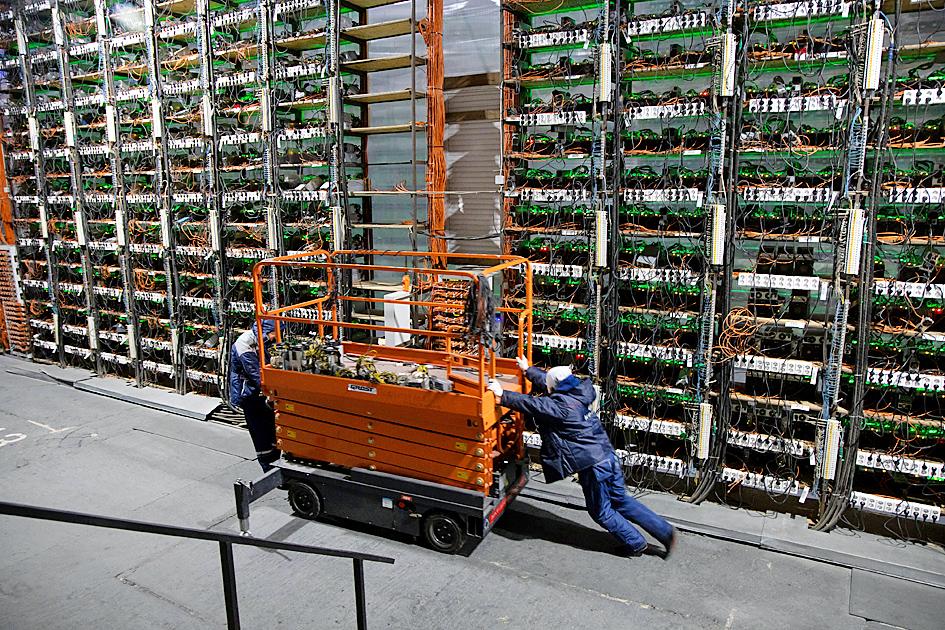Estonia has moved to calm investor fears about tougher rules on cryptocurrency, a sector that has been a target of regulatory scrutiny for the Baltic nation since at least 2019.
The country is considering new rules that would enforce due diligence, audits and higher levels of capital for crypto firms ahead of a review of its policies to counter money laundering this quarter.
The proposed rules still need parliamentary approval.

Photo: Bloomberg
The Estonian Ministry of Finance issued a statement and a list of frequently asked questions after speculation that the new rules would shut down cryptowallets and ban trading in bitcoin.
Estonia “recently introduced draft legislation that would tighten regulation of virtual asset service providers,” the ministry said in a statement.
“However, Estonia has no plans to make owning cryptocurrencies illegal, as some misconceptions on social media claim,” it said.
The Baltic nation was one of the first countries to grant cryptocurrency licenses in 2017, attracting a surge in companies interesting in doing business in the sector.
It has since revoked about 2,000 of these and only about 400 licensed companies remain.
Estonia took a tougher stance on crypto after allegations that billions of dollars of illicit cash flowed through the local unit of Denmark’s largest lender Danske Bank A/S, in what was then Europe’s biggest ever dirty-money scandal.
Estonian Financial Intelligence Unit director Matis Maeker told local media in October that all cryptolicenses could be revoked and companies forced to reapply for accreditation.
His spokesman later said that this was not the official view of the agency and the government did not pursue it.
Separately, bitcoin is starting off the new year on a down note.
Bitcoin, which is the largest digital coin by market valuation, fell as much as 2.8 percent during Monday’s session to US$45,715.
That means it was trading below its average price over the past 200 days, which currently stands at US$47,923.
The session is setting bitcoin up for its seventh consecutive close below that threshold, which is watched closely by chartists.
“Bitcoin is acting just like another risk asset,” said Steve Sosnick, lead strategist at Interactive Brokers LLC. “In some ways, it’s a victim of its success, because so much risk capital has moved into bitcoin and to a certain extent other cryptos.”
Technicians are also watching bitcoin’s relative strength index, which is nearing oversold territory.
Strategists at Oppenheimer say that bitcoin’s heightened volatility makes it difficult for them to trade.
Still, if they use its 200-day moving average stat in the same way that they utilize it for stocks, then they foresee it could break above US$65,000 — as long as it maintains US$46,000, they said in a note.
Cryptocurrencies overall finished last year on a sour note. Bitcoin fell roughly 19 percent last month, one of its worst months of the year.
The Bloomberg Galaxy Crypto Index, which tracks a handful of some of the largest coins, lost nearly 23 percent in that period.

Taiwan’s long-term economic competitiveness will hinge not only on national champions like Taiwan Semiconductor Manufacturing Co. (TSMC, 台積電) but also on the widespread adoption of artificial intelligence (AI) and other emerging technologies, a US-based scholar has said. At a lecture in Taipei on Tuesday, Jeffrey Ding, assistant professor of political science at the George Washington University and author of "Technology and the Rise of Great Powers," argued that historical experience shows that general-purpose technologies (GPTs) — such as electricity, computers and now AI — shape long-term economic advantages through their diffusion across the broader economy. "What really matters is not who pioneers

In a high-security Shenzhen laboratory, Chinese scientists have built what Washington has spent years trying to prevent: a prototype of a machine capable of producing the cutting-edge semiconductor chips that power artificial intelligence (AI), smartphones and weapons central to Western military dominance, Reuters has learned. Completed early this year and undergoing testing, the prototype fills nearly an entire factory floor. It was built by a team of former engineers from Dutch semiconductor giant ASML who reverse-engineered the company’s extreme ultraviolet lithography (EUV) machines, according to two people with knowledge of the project. EUV machines sit at the heart of a technological Cold

TAIWAN VALUE CHAIN: Foxtron is to fully own Luxgen following the transaction and it plans to launch a new electric model, the Foxtron Bria, in Taiwan next year Yulon Motor Co (裕隆汽車) yesterday said that its board of directors approved the disposal of its electric vehicle (EV) unit, Luxgen Motor Co (納智捷汽車), to Foxtron Vehicle Technologies Co (鴻華先進) for NT$787.6 million (US$24.98 million). Foxtron, a half-half joint venture between Yulon affiliate Hua-Chuang Automobile Information Technical Center Co (華創車電) and Hon Hai Precision Industry Co (鴻海精密), expects to wrap up the deal in the first quarter of next year. Foxtron would fully own Luxgen following the transaction, including five car distributing companies, outlets and all employees. The deal is subject to the approval of the Fair Trade Commission, Foxtron said. “Foxtron will be

INFLATION CONSIDERATION: The BOJ governor said that it would ‘keep making appropriate decisions’ and would adjust depending on the economy and prices The Bank of Japan (BOJ) yesterday raised its benchmark interest rate to the highest in 30 years and said more increases are in the pipeline if conditions allow, in a sign of growing conviction that it can attain the stable inflation target it has pursued for more than a decade. Bank of Japan Governor Kazuo Ueda’s policy board increased the rate by 0.2 percentage points to 0.75 percent, in a unanimous decision, the bank said in a statement. The central bank cited the rising likelihood of its economic outlook being realized. The rate change was expected by all 50 economists surveyed by Bloomberg. The